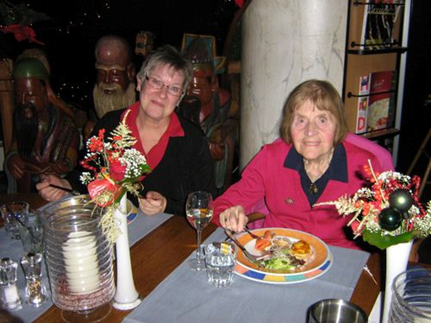
Mar 10, 2023
Caregiver for administration and financial organisation
Hanneke Goedings became her mother's informal carer when her mother had to move because of her Dementia diagnosis.
Published by: Norfolk County Council
Caregiver for administration and financial organisation.
by Hanneke Goedings

My mother had been diagnosed with dementia and she was still living independently in Hilversum, which is near Amsterdam in the Netherlands.
When she had a stroke, she moved into assisted living housing in Zeeland, closer to where I live and I became her informal carer.
While cleaning up her house, I found financial chaos:
• 6 bank accounts
• unseen savings bank accounts for the grandchildren
• unpaid bills and reminders
• at least 30 direct debits to charities (found on bank statements)
• insurance policies that were no longer needed
• member of a book club, whose unpacked books were stacked everywhere.
When my father had died, he left my mother in a good financial position, with a generous pension and of course her own state pension. She only used her bank card to regularly take money out of the cashpoint and pay for her groceries when she could still go shopping herself. She could remember her PIN and many phone numbers even well into her dementia.
We went to the bank together to organise her finances. We arranged for me to be able to access her main bank account, where most of the money came in and set up the online banking facility. We then have closed all of the other bank accounts. I made sure that there was about €500 remained in the remaining account to serve as "pocket money". That way she could still buy something herself and get money out of the cash point if she wanted to. The rest of her money was put into a new savings account.
After that, I stopped more than 30 direct debits for charities. It was agreed with her that she could, of course, continue to give money to charities, but then as a one-time gift and not as a direct debit. However, as her dementia progressed, she could not remember this agreement. But it never got out of hand because she no longer made charitable donations.
Then there were club memberships, which had to be cancelled, and the unnecessary insurances. I found a very old funeral insurance taken out in 1953, which I had to investigate which company this insurance had ended up with and how much the policy was worth. This was quite a job, because small insurance companies are taken over time and time again by larger companies. Finally, the full amount was paid to me after her death.
After cancelling the book club there was an additional problem. This particular club telephoned my mother to make her a member again with the bonus of a free book. To cancel the membership again took quite a few phone calls and angry letters.
For larger expenses, for example gifts for children and grandchildren, I always consulted with my mother and ensured that she could more or less decide and handle this herself. If specific things were needed, we were told by the assisted living staff and I bought it for her. I also made sure that she had the clothes she wanted too.
Anecdote: after a dinner for her birthday in a restaurant, she gave the bank card to my sister to pay and shouted loudly through the restaurant: "the PIN code is 4224". It wasn't very safe, but it was funny. We would say, "Mom, you've cooked so well!"